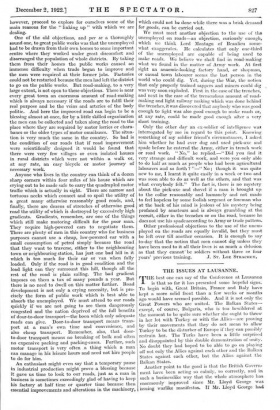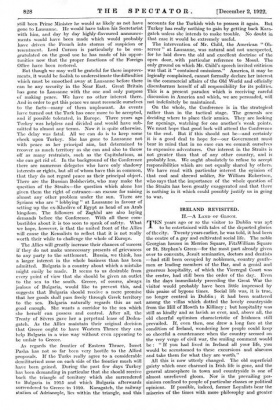THE ISSUES AT LAUSANNE. T HE best one can say of
the Conference at Lausanne is that so far it has presented some hopeful signs. To begin with, Great Britain, France and Italy have kept a more solid front than a few weeks or months ago would have seemed possible. And it is not only the Great Powers who are united. The Balkan States— except, of course, Bulgaria, who is too bewildered at the moment to be quite sure whether she ought to throw in her lot with Turkey or with the Allies—are proving by their movements that they do not mean to allow Turkey to be the disturber of Europe if they can possibly restrain her. The Turks have been a little surprised and disappointed by this double demonstration of unity. No doubt they had hoped to be able to go on playing off not only the Allies against each other and the Balkan States against each other, but the Allies against the Balkan States.
Another point to the good is that the British Govern- ment have been acting so calmly, so correctly, and in such a businesslike way that the whole atmosphere has enormously improved since Mr. Lloyd George was issuing warlike manifestos. If Mr. Lloyd George had still been Prime Minister he would as likely as not have gone to Lausanne. He would have taken his Secretariat with him, and day by day highly-flavoured announce- ments would have been made which would probably have driven the French into storms of suspicion or resentment. Lord Curzon is particularly to be con- gratulated on the good use he has made of his oppor- tunities now that the proper functions of the Foreign Office have been restored.
But though we may well be grateful for these improve- ments, it would be foolish to underestimate the difficulties which must be smoothed away at Lausanne before there can be any security in the Near East. Great Britain has gone to Lausanne with the one and only purpose of making peace. We have no other interest there. And in order to get this peace we must reconcile ourselves to the facts—many of them unpleasant. As events have turned out the Turk has once more to be accepted, and if possible tolerated, in Europe. Three years ago Turkey was helpless and divided and would have sub- mitted to almost any terms. Now it is quite otherwise. The delay was fatal. All we can do is to• keep some cheek upon Turkey. She has gone to Lausanne not with peace as her principal aim, but determined to recover as much territory as she can and also to throw off as many restraints, such as the Capitulations, as she can get rid of. In the background of the Conference there are numerous delegates who have only shadowy interests or rights, but all of whom have this in common, that they do not regard peace as their principal object. There arc the Russian Bolshevists, who may make the question of the Straits—the question which alone has given them the right of entrance—an excuse for raising almost any other problem under the sun. There are Syrians who are " lobbying " at Lausanne in favour of setting up the ex-Khedive of Egypt as head of an Arab kingdom. The followers of Zaghlul are also laying demands before the Conference. With all these com- bustibles about it is too soon to speak of safety. What we hope, however, is that the united front of the Allies will cause the Kemalists to reflect that it is not really worth their while to challenge the whole of Europe.
The Allies will greatly increase their chances of success if they do not make unnecessary presents of grievances to any party to the settlement. Russia, we think, has a larger interest in the whole business than has been admitted. Bulgaria is a country about which a mistake might easily be made. It seems to us desirable from every point of view that she should be given an outlet to the sea to the south. Greece, of course, always jealous of Bulgaria, would like to prevent this, and suggests that Bulgaria should receive a mere promise that her goods shall pass freely through Greek territory to the sea. Bulgaria naturally regards this as not good enough. She wants a corridor to the sea which she herself can possess and control. After all, the Treaty of Sevres gave her a perpetual lease of Dedea- gatch. As the Allies maintain their original decision that Greece ought to have Western Thrace they can help Bulgaria in a wise way without even appearing to be unfair to Greece.
As regards the frontier of Eastern Thrace, Ismet Pasha has not so far been very hostile to the Allied proposals. If the Turks really agree to a considerable demilitarized zone on each side of the frontier much will have been gained. During the past few days Turkey has been demanding in particular that she should receive back the triangle of territory which she surrendered to Bulgaria in 1915 and which Bulgaria afterwards surrendered to Greece in 1920. Karagatch, the railway station of Adrianople, lies within the triangle, and this accounts for the Turkish wish to possess it again. But Turkey has really nothing to gain by getting back Kara- gatch unless she intends to make trouble. No doubt in that case it would be extremely useful.
The intervention of Mr. Child, the American " Ob- server " at Lausanne, was natural and not unexpected, for he laid down the old and excellent doctrine of the open door, .with particular reference to Mosul. The only ground on which Mr. Child's speech invited criticism was that it "contained omissions." America, it may be logically complained, cannot formally declare her interest in the commercial affairs of the Old World and officially disembarrass herself of all responsibility for its politics. This is a present paradox which is receiving careful discussion in America and which, we are persuaded, will not indefinitely be maintained.
On the whole, the Conference is in the strategical rather than in the tactical stage. The generals are deciding where to place their armies. They are looking for openings, watching for one another's weak points. We must hope that good luck will attend the Conference to the end. But if this should not be—and certainly it is a good deal to hope for—our Government must bear in mind that in no case can we commit ourselves to expensive adventures. Our interest in the Straits is not greater than that of any other country, and is probably less. We ought absolutely to refuse to accept responsibilities which are not equally shared by others. We have read with particular interest the opinion of that cool and shrewd soldier, Sir William Robertson, who says that the importance of the whole question of the Straits has been greatly exaggerated and that there is nothing in it which could possibly justify us in going to war.







































































 Previous page
Previous page